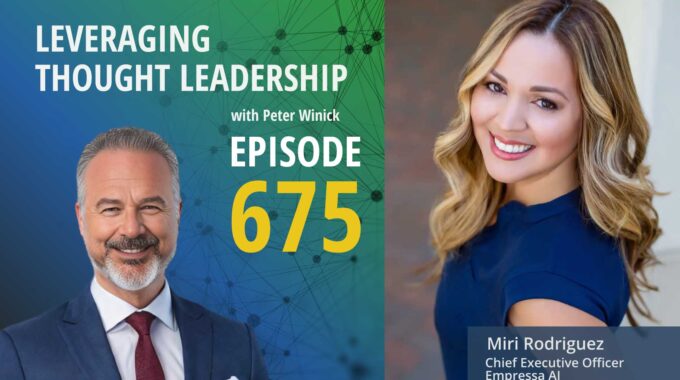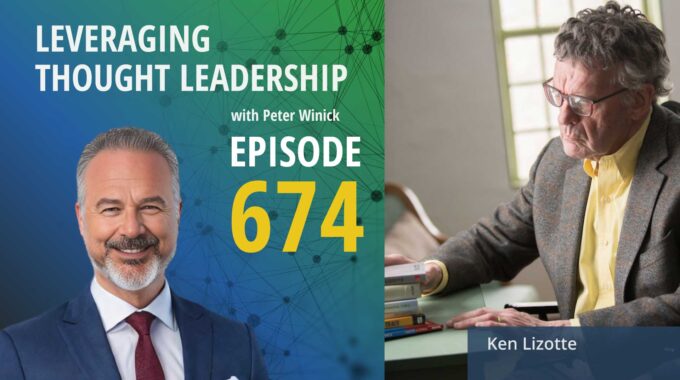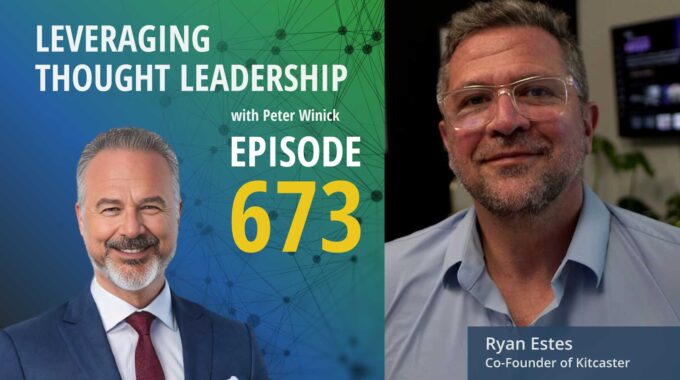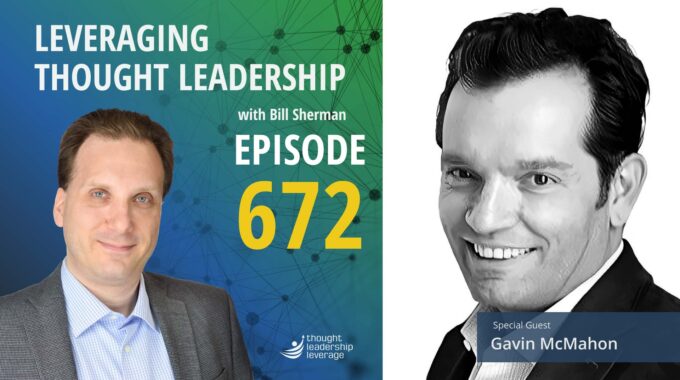Building Brand Love Through Storytelling This episode explores how storytelling can drive inclusion, purpose, and…
Public Relations for Thought Leadership Books | Mark Fortier
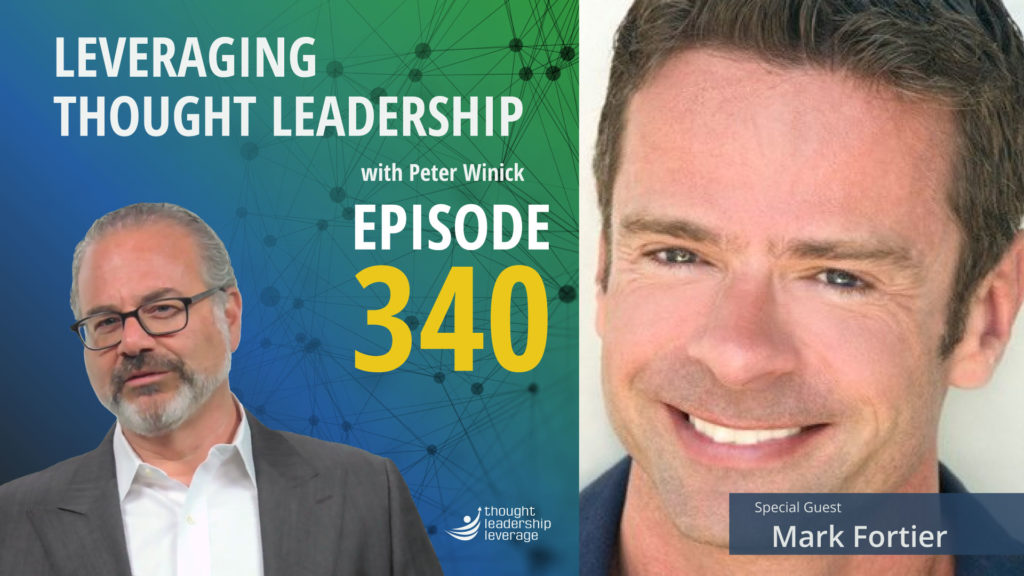
The importance of public relations for thought leadership authors.
An interview with Mark Fortier about working with a public relations firm to increase a thought leadership book’s success.
Savvy authors know that public relations can be more unpredictable than marketing. So, how do you navigate those treacherous waters and find success?
Today’s guest is Mark Fortier, founder of Fortier Public Relations. Mark has spent 30 years publicizing hundreds of important books, including 140 bestsellers! Now, he’s here to share tips and tricks with us that are essential for making your thought leadership book a success.
When taking a book to market, authors often only look at big wins. It’s important to get coverage in large media outlets, but what most don’t realize is that it’s often small, incremental goals that really move the needle. Mark explains how and why it is important to manage expectations, and why you should work to create close relationships in order to help your book’s audience grow. He also discusses the ways PR has changed over the years, and how online interviews and podcasts have become an important part of any successful author’s portfolio.
One of the ways that authors and publishers support a book is by focusing on an existing platform. Mark discusses the importance of creating a pre-established, strong social network (and potential audience) before your book gets published, and offers alternatives if you don’t have one in place. It’s important to live up to your publisher’s expectations, but Mark shares his hard-won wisdom on the things an author should look for and expect from their publisher as well.
Three Key Takeaways:
- Thought leaders publishing their first (or fifth!) book can benefit from the knowledge and experience of public relations firms.
- Social media is a long term strategy. Thought leaders publishing a book need to start building a large, connected network as early as possible.
- Thought leaders should seek out a publisher they can work with, and ensure that their publisher truly understands the material’s message.
If you need a strategy to bring your thought leadership to market, Thought Leadership Leverage can assist you! Contact us for more information. In addition, we can help you implement marketing, research, and sales. Let us help you so you can devote yourself to what you do best.
Transcript:
Peter Winick And welcome, welcome, welcome, this is Peter Winick, I’m the founder and CEO of Thought Leadership Leverage, and you’re listening to the podcast today, which is Leveraging Thought Leadership today. My guest is Mark Fortier, who is the founder of Forty Eight Public Relations. He’s been 29 years at this, publicizing hundreds of successful books. It’s earned him the 2019 Porchlight – Jack Covert Award for contribution to the business book industry. He’s the sixth recipient and only publicist following previous winners like Computers and Seth Godin. He’s publicized over 100 bestsellers and 17 number one bestsellers. He’s worked on books by 33 of the thinkers 50, including Jim Collins, Clayton Christensen, Ron Shrum, Seth Godin. If we’re the only go over the books that Mark has done well and been involved in, we’d be out of time quickly. So I’m going to just instead fast forward and dove right in. Welcome aboard, Mark.
Mark Fortier That to be here, Peter. Thanks for having me.
Peter Winick Yeah, so let’s just dove in. I think that what I find interesting about PR and where it fits into default leadership and where it fits into book launches is, I think oftentimes there’s a buyer that doesn’t really understand what they’re buying and what the expectations are and what’s realistic and what’s not. So is it a fair statement or how would you how would you think of that?
Mark Fortier So for a client, for clients, you mean as the buyer, right? Yeah, let’s see. So expectation management certainly is a big part of my job and definitely PR is a unpredictable thing. Unlike things like marketing and stuff like that, so you do have to be very closely engaged with your clients. So we have a team of 25 people, and one of the things I always train my people on is make sure your relationship with your client is as tight as can be. We aim to bond with each other so that you know, everything about each other’s families and their daily lives. And if there’s going to be some losses, you’re going to cry together and there’s going to be many wins to celebrate together and to always have that strong partnership. So with us, we always say probably a bad idea to go into a campaign with expectations, instead great ideas to go in with high goals. Those are two very different things. So if you say, I know I’m going to get the front page of the New York Times, The Today show and this and anything less, I’m going to be sad about that. You’re probably going to be disappointed. But if you go into it thinking, Gosh, my top goal is I really want the New York Times, I really want CNBC and marketplace and fortune. Let’s come up with our best strategy to get there. Let’s collaborate and really work towards it together and then celebrate those as wins. And chances are that’s going to be a happy relationship and our client will be back for more.
Peter Winick I think that’s right. So talk for a little bit about how the market has changed. So it used to be maybe 10 years ago, maybe a bit more that a lot of PR was a swing for the fence. Meaning, Yeah, we want you on the Today show. Oh my, if we got an author on the Today Show the world changes or if we got a New Year kind of business book review, which I don’t remember the last time I’d seen a lot of those business books or they’re actually in the business section now where some of these big visibility, big brand things would be game changers. And I think where I’ve seen it evolve over the last several years is, yeah, that’s one way to do it. But more likely, it’s about understanding the niches and building small wins on top of small wins, on top of small wins to equal, in your words, to get to the goal. So how would you think about that?
Mark Fortier So it’s still a little bit of both. So there definitely are big wins. We call them needle movers in our in our industry, and those are definitely what we are eyes on. Yes, there’s also incremental growth of working towards those goals in small ways. I’d say the media landscape for business books is relatively similar to what it was 15 years ago. So we still go after CNBC and Fox and Wall Street Journal and other times, finances and fortune. But the podcast is definitely something like this one that has really risen influence. So we’ve made a big investment in that area. We’ve hired a full time podcast. Booker built our own database from scratch because at that time there actually was none. Believe it or not, we measure the impact and have data on all the podcasts. We have them broken down into one hundred and seventy five different categories, from innovation to leadership to career. So a big part of our campaigns is now. And yeah, we just had a client on Tim Ferriss few weeks ago, and he just hit the near-vertical bestseller list. So there definitely are those podcasts that are huge needle movers. But, you know, traditional media can and still also have that that same impact. So it’s just changed a little bit about where those needle movers are. And we also we also have a very multi-channel approach to marketing our authors. So right, call the PR firm because that’s what people understand. But media placement is just one aspect of what we do. We know that for every book, there might be a different thing that’s going to sell the book. So we book podcasts. We have a full time events manager, booking talks and virtual events. We help authors leverage their networks through preorder campaigns, both order strategies, influencer campaigns. So that’s definitely changed. And I do think there is a lot more emphasis now with the author of how well they leverage their network. That’s a really important part.
Peter Winick So let’s stop them from talking about the authentic because yeah, and you’ve probably seen something similar. Different types of authors come to you with a different network, right? So someone comes to you. And hey, the book’s coming out in six months and they’ve got a phenomenal network. It’s great. Someone comes to you and they’ve got a mediocre network. And then, you know, the worst cases they come to you with virtually no network. How critically important is it to have some level of network and sort of nurturing and building that? Not because it’s not something you can do 30 days before a book launch? Yeah.
Mark Fortier And it was, first of all, part of the reason we have a multichannel approach is because every book an author is going to come with different assets and sometimes you know which of those channels is going to be the most successful and sometimes it’s a surprise. And some authors, they’re huge on the speaking circuit, but the TV people don’t want to touch them and vice versa. So let’s see. How else do I answer that question?
Peter Winick Well, I was looking for maybe a bit of insight on how important it is to or not, maybe the constantly nurturing. OK, right? Yeah. Network followers or social media presence that that whole series.
Mark Fortier So I mean, one thing I often tell authors is if they have no social media presence and they’re hoping to sell their book in a few months, probably a crazy idea to think, OK, I can get my followers up to enough numbers to make it worth it. And so in that case, the influencer marketing becomes all the more important. So if you aren’t on social media but you have 10 friends that are huge on social media, then contact them and give them the assets to sell you and plug you and recommend you. And that’s going to have far more impact than you trying to get your own network up to speed, if you can do that. That’s great. Social media tends to be more of a long term strategy where you’re building up your network and absolutely you see authors who had really no profile, no credentials achievement, and they just worked at their network over time and have built followings of millions of followers. And then because of that, then the TV shows call because they have a following and it creates a whole new reality for them. So it’s probably a short term versus long term question.
Peter Winick Well, and I think authors are really good at helping authors. And what I mean by that is, and it’s not a quid pro quo. It’s like, Hey, I’m a I’m a business author, you’re a business author. Maybe you’re newer to the game or I have a stronger following than you. But they’re really, really good at sharing testimonials across promoting and utterly agree. It’s interesting because if you know I’m a fan of Author X and they’ve got 100000 followers and they recommend, you know, a new author that I haven’t heard of, that means a lot. On the other side, so anything that you’re helping your clients with to nurture those relationships with other authors?
Mark Fortier You know, let’s see. I mean, you’re definitely right that there is that that network out there. And that’s often how people come to us to because they hear about it from their authors. And you write that it’s a very supportive network. So our process is we work with each author and tell them, OK, what? Let’s put your network onto paper. We create Google spreadsheets in different categories for them. So where they’re individual influencers that they know that Adam Grant types, what are organizations, that they have relationships? And then who’s their mass network for a preorder campaign? And then for the influencers in their network, they should think of, well, what’s in it for them? So if you’re asking them to help you, what can you do back there for them? A lot of people, for a lot of people, they’ve built up goodwill and they’ve never asked for a favor before. And this book is the. It’s time that they get to do that so that they’re going to get some great love back. Sometimes we recommend that authors create what we call a marketing team or ambassador program of. If you join my inner circle and you’re kind of joining the marketing team, you’re going to get this in exchange and we’re all invested in this together and it feels a little less lonely as well. And then probably you’re going to help them out in the same way. Sure. Their book when that time? Well, I think
Peter Winick what’s interesting and I’ve seen a lot of that is it’s amazing when you ask what you’ll get, right? So if you’ve got, you know, you’ve already got fans or followers or whatever and you say, Yeah, I want this special group of 20 to help me launch the book. It’s amazing how many people love to do that and support someone whose work they back.
Mark Fortier Yeah, I literally just before this interview was doing a call with the CEO and I was going over the preorder campaign and he was feeling very squeamish about it. I think it’s like, I just can’t imagine asking people for something or selling something. And then when they do it, it’s always their favorite day of the campaign because they get hundreds of emails back on love and everyone they’ve ever done a favor for says, How can I help you? What can I do? And it’s just a great feeling.
Peter Winick If you’re enjoying this episode of Leveraging Thought Leadership, please make sure to subscribe. If you’d like to help spread the word about our podcast, please leave us a review and share it with your friends. We’re available on Apple Podcasts and on all major listening apps, as well as at ThoughtLeadershipLeverage.com forward slash podcasts. Yet I think there’s a big difference between feeling like you’re selling your book and empowering a community to support you as appreciation acknowledgment, being part of the tribe, whatever the case may be. I want to talk for a moment because you’ve got good insight on this in terms of what are what is a realistic or unrealistic expectation that an author may have of their publishers. Because I’ve seen that if you look at that as a continuum, I’ve seen, wow, that is not realistic. And that’s pretty pragmatic, and you should be able to expect that we’re talking about that for a little bit that author, publisher relationship, because that’s a that’s a word.
Mark Fortier Yeah, I mean, it definitely varies publisher to publisher, but I’d say over the last few decades it has it has changed where it used to be more of a mother hen relationship where the authors, it’s there and the publisher promotes the hell out of their book and sends them on to other tours. Now it’s much more of a two way partnership, and you’ll feel that at the contract stage with the publisher where they’ll be asking, Well, if we’re going to sign you. What are you bringing to the table and who’s in your network? And how many followers do you have? So that it’s a two way partnership and each partner is contributing to the success of the book
Peter Winick and the one I want to just push on that. So in one of the things I think that happens more and more today than ever is when they’re evaluating a publisher to take on an author, not just the advance, but holistically looking at it. It’s not just obviously table stakes. Great content, great book. You know how to write the table stakes, even though that is not easy. But they are now more than ever judging on, oh you know, two authors all being equal. One’s got, you know, whatever, 30000 followers on Lincoln. That’s a huge deal in terms of a table.
Mark Fortier Yeah, that’s the magic word. We call them publishing platform. Yes. So we also help advise authors on doing book proposals. A lot of authors, first of all, don’t even know where to start. So if they do writing a script, how do I get it to a publisher? And some naively pick up the phone and I can just call an editor and say, I’ve got an idea
Peter Winick that’s seven to get published right here. Doesn’t work like, yeah,
Mark Fortier so you know you need to develop a very well thought out proposal. There’s scores of books on Amazon about how to write a good proposal. Some people spend a year or more in developing that proposal to be that compelling that it’s going to make a best publisher want to publish them. So proposals are super important and they have different sections, and one of the most important is your platform.
Peter Winick Which is it goes back to the marketing question. So what’s realistic to the publisher now has expectations of the author of network. You’ll have systems and processes to engage that network to help what you’re an author be looking for because I think the other side of that is if I’m an author, I have choices today. I can self-publish, I can hybrid publish. I could traditional published. And I think oftentimes authors have this sense of, you know, sort of what you call the sort of the mother hen syndrome like, Oh, I’m going to get a publisher. All I have to do is write amazing things, and the publisher does that. Other stuff like make your books fly off the shelf and what are the things that an author should be thinking about relative to choosing or partnering with a publisher today?
Mark Fortier You know, let’s see. So you mentioned first self-published hybrid traditional publishers, so I think that’s probably the first choice to make, and that’s a tricky choice to make. So I would say if let’s say you’re a speaker and you’re going to your events and you want to have product and content to sell at those events or you have your own audience, you know how to reach them and you just want to get your content to that audience or you’re using your book as a calling card for your business. Those are all very legitimate reasons to do a book, and self-publishing might be the best option for you. Some people think, you know, self-publishing, it’s faster. I have more control and then are disappointed to learn that most media, not all, but most media won’t even consider a self-published book. And so you can still market it, but it’s pretty much more on you, and you kind of want to think of what? Why is it that you’re publishing a book? People publish books for all kinds of reasons.
Peter Winick What are your objectives? What’s the point?
Mark Fortier Yeah. So if you know, if you have this vision of I want the glory of being published and I’m in the New York Times and there’s events and there’s excitement and everyone’s heard about it, then you probably do want to aim for a traditional publisher and maybe a publicist. So that’s the first choice to make. And then you’d probably want to work with a literary agent who would sell you to a traditional publisher if that’s the way you want to go. And then, yeah, I’d definitely be looking for the marketing plan. What are they saying they are going to bring to the table? Chemistry is really important. Sometimes when a publisher will really be impressive and their brand sounds great. But another publisher, they just gel with you and you just feel like this editor understands my message and I really want to work with them to develop this book. That’s a really important reason to choose a certain publisher. Her brand is certainly a factor. The media and influencers do decide whether they’ll cover something depending on the brand of the publisher. So I’d say those are the three most important criteria. There’s others, but those will be the top three.
Peter Winick Got it. Got it. And I think, you know, we touched on a bit earlier. People go into this space and there’s a lot to learn. You’ve been around, so
Mark Fortier you can imagine and imagine,
Peter Winick even when you explain to a client like, Hey, here’s there are business model issues to think about other than the branding, but yet self and hybrid in this, and you have to you have to there’s multiple factors that you have to take into consideration. And it’s a significant investment time, energy, effort, money, opportunity, cost, et cetera. And I think there are a lot of myths that are out there or fantasies or we call them what you will about what that looks like. What are some of the things that you’re seeing today that are really helpful, creative, you know, unique that authors are doing to get the message out and get the book? We mentioned podcasting before. I don’t know if that’s particularly new, but I think it’s become a significant piece of the marketing buffet, if you will.
Mark Fortier Yes, it’s certainly in podcasts, are very influential and, you know, well, we have close relationships with them if an author can certainly try to pitch podcasts on their own. Let’s see for the preorder campaign’s having an incentive strategy can be helpful. So if you buy one copy, you get this piece of content. If you buy 100 copies, you might get a virtual event. If you buy doing under copies, you get me in person. Sure. He courses are something that authors are doing a lot of these days, and that might be as again as an incentive strategy if you sign up for this. You got some tours. Yeah. So by the book you get, you get access to this course. That can be a helpful strategy. There’s definitely all kinds of channels that are available. Clubhouse is definitely the hot. Yeah, new new thing. And with all new, new things, it’s hard to know if it’ll last or if people will get tired of it and move on to the next new thing in a few months. But right now, no, what it is, it is red hot right now and it was very well promoted, very well launched and the crowd that is your crowd, Peter and Microb, Peter and probably all the listeners grass listening is on clubhouse. You know, you’d be amazed at some of the big name influencers that you just feel are unattainable. You kind of access to anywhere in the room with you at this event, and it’s pretty easy to navigate and figure out and plan your own event. So that’d be one of my top new recommendations.
Peter Winick Yeah, that’s great. Well, I appreciate your time. I appreciate you sharing your wisdom with us because you’re knee deep in this for a long, long time. Are you? No. Thank you. Thank you for spending the time with us today, Mark and sharing your observations. I appreciate it.
Mark Fortier It’s been a pleasure, Peter. Thanks for having me.
Peter Winick To learn more about Thought Leadership Leverage, please visit our web site at ThoughtLeadershipLeverage.com to reach me directly. Feel free to email me at Peter at ThoughtLeadershipLeverage.com and please subscribe to Leveraging Thought Leadership on iTunes or your favorite podcast app to get your weekly episode automatically.



